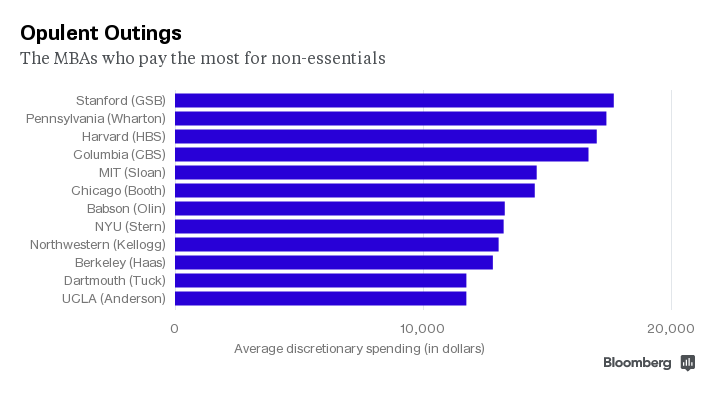At Business School, Networking Can Cost $18,000 a Year
by Natalie Kitroeff
1:26 PM EST February 12, 2015 - Bloomberg Business
It can start with a visit to a secluded island off Colombia,
like the sojourn that more than half of Stanford's
incoming MBAs spent last August. Or a weekslong trek in Australia and
New Zealand, another in Dubai and Abu Dhabi, a foray to Thailandfs bays,
and a stop in Munich for Oktoberfest—excursions taken this academic year by
students at the University of Pennsylvaniafs Wharton
School. Plus countless ski trips—to resorts in Park City, Utah, Aspen,
Colorado, and Lake Tahoe—that draw students for a weekend off, or more,
from their studies at elite MBA programs across the country.
Travel to far-flung destinations and to swanky enclaves closer to home
has become a hallmark of elite U.S. business schools, where the point of two
years on campus can seem to be to spend as much time away from campus as
possible. The better the school, apparently, the higher the premium on travel
and fun: Students at top-tier business schools spend thousands of dollars each
year on discretionary expenses and tend to spend considerably more than their
peers at lower-ranked schools, according to Bloomberg Businessweek
data.
Building friendships with the next generation of executives may be a worthy
investment, but itfs not cheap.

Most of the schools where students said they spent the most on
discretionary purchases were ranked in the top 20 by Bloomberg
Businessweek in 2014.
The trips pay off over time, some say. gThis group of people
that I'm in school with right now, in 10 years are going to be the
next CEOs,h says Phuong Nguyen, a second-year student at HBS who has
traveled to Israel, among other places, with her fellow MBA candidates. The
trips can cost up to $3,000, not including airfare, she says, but that's nothing
compared with the benefits of putting in time with people who could
aid her career climb. gItfs investing in more than just knowing the names, but
knowing the story behind them.h
Others aren't convinced that luxury budgets have a higher purpose.
gWharton encourages extravagant spending,h one student said anonymously in
Bloomberg Businessweek's survey, calling the spending gtoxic.h
Wrote the student: gThe mentality is that we'll be rich eventually, so why
not spend a ton of money now while we're in debt.h
Two years at a top business school costs around $100,000 in tuition, and
students at these programs have even more debt than their peers, who are also
heavily indebted. At Dartmouth Universityfs Tuck
School of Business, the median debt load for students was $90,000, including
student loans, credit card debt, and personal debt, twice as high as the
median of $40,000 at all U.S. schools. Wharton students said their median debt
was $66,000.
Nguyen, the HBS student, says she skipped out on a recent trip to Dubai but
doesn't think that missing one jaunt will affect her overall network.
Opting out of group excursions is, she says, always a viable option. Just
don't expect most students to join you—for many of the HBS trips, Nguyen says,
demand is so high that you have to be picked in a lottery before buying plane
tickets.